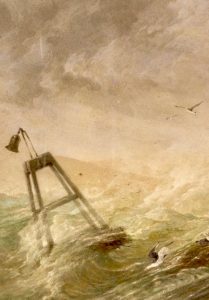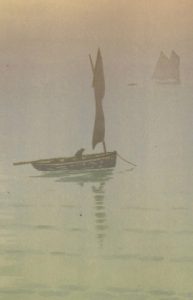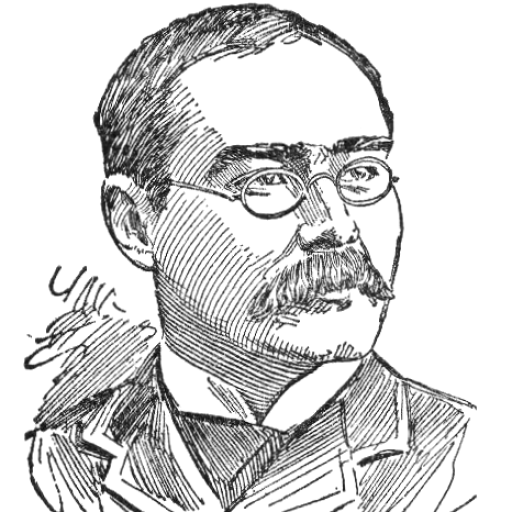Will they give me thanks if they clear the banks?

Kipling had a life-long fascination with machinery; as far as I know, he was the first poet to endow man-made objects with a personality of their own. Whereas for example many before him wrote poems about ships, in Kipling it is ships – such as ‘Destroyers’ or ‘A Derelict’ – which tell their own story. A bell buoy is a metal floater anchored over a shoal and armed with a bell or with four hammers, which are made to ring by the rocking of the waves. Before sonar or GPS, it thus warned ships of the shoal even at night or in fog. It is a nameless tool doing a thankless work, set in comparison with the church-bell, which carries a saint’s name and is the pride of the parish.
‘The Bell Buoy’, written in 1896, contains some of the most superb lines of sea-poetry anywhere:
"The landward marks have failed, The fog-bank glides unguessed, The seaward lights are veiled, The spent deep feigns her rest ..."

‘The Bell-Buoy’ expresses the joy at doing one’s thing: “I rock, I reel, and I roll / My four great hammers ply … ” While the refrain “Shoal! ‘Ware shoal!” catches the sound of a bell heard from afar through the fog. But what gives “the Bell Buoy” its special force is the way it conveys the Christian teaching of serving others without expecting gratitude: “Will they give me their thanks if they clear the banks?/ (Shoal! ‘Ware shoal!) Not they! ” And “Will they give me their thanks if they clear the banks?/ (Shoal! ‘Ware shoal!) Not they! “
At the same time, ‘The Bell Buoy’ shares with Kipling’s songs of travel a sense of adventure and restlessness. Although stuck in one place, the Bell Buoy’s life is full of changes: the fog, the darkness, the frost, the snowstorm, the excitement of saving a ship’s crew – the Bell Buoy prefers them to the prestigious but monotonous life of his brother the church bell: “He counts the changeless hours”…Thus ‘The Bell Buoy’ is a soul brother to ‘Chant-Pagan’ and to the ‘ Sestina of Tramp-Royal’. These three are my most favorite Kipling poems.
The Bell-Buoy
They christened my brother of old - And a saintly name he bears - They gave him his place to hold At the head of the belfry-stairs, Where the minster-towers stand (1) And the breeding kestrels cry. (2) Would I change with my brother a league inland? (Shoal! 'Ware shoal!) Not I! In the flush of the hot June prime, O'er sleek flood-tides afire, I can hear him hurry the chime To the bidding of checked Desire; (3) Till the sweated ringers tire And the wild bob-majors die. (4) Could I wait for my turn in the godly choir? (Shoal! 'Ware shoal!) Not I! When the smoking scud is blown - (5) When the greasy wind-rack lowers - (6) Apart and at peace and alone, He counts the changeless hours. He wars with darkling Powers (I war with a darkling sea); Would he stoop to my work in the gusty mirk? (7) (Shoal! 'Ware shoal!) Not he! There was never a priest to pray, There was never a hand to toll, When they made me guard of the bay, And moored me over the shoal. I rock, I reel, and I roll - My four great hammers ply - Could I speak or be still at the Church's will? (Shoal! 'Ware shoal!) Not I! The landward marks have failed, The fog-bank glides unguessed, The seaward lights are veiled, The spent deep feigns her rest: But my ear is laid to her breast, I lift to the swell - I cry! Could I wait in sloth on the Church's oath? (Shoal! 'Ware shoal!) Not I! At the careless end of night I thrill to the nearing screw; I turn in the clearing light And I call to the drowsy crew; And the mud boils foul and blue As the blind bow backs away. (8) Will they give me thanks if they clear the banks? (Shoal! 'Ware shoal!) Not they! The beach-pools cake and skim, The bursting spray-heads freeze, I gather on crown and rim The grey, grained ice of the seas, Where, sheathed from bitt to trees, (9) The plunging colliers lie. (10) Would I barter my place for the Church's grace? (Shoal! 'Ware shoal!) Not I! Through the blur of the whirling snow, Or the black of the inky sleet, The lanterns gather and grow, And I look for the homeward fleet. Rattle of block and sheet - (11) "Ready about - stand by!" (12) Shall I ask them a fee ere they fetch the quay? (13) (Shoal! 'Ware shoal!) Not I! I dip and I surge and I swing In the rip of the racing tide, By the gates of doom I sing, On the horns of death I ride. A ship-length overside, Between the course and the sand, Fretted and bound I bide (14) Peril whereof I cry. Would I change with my brother a league inland? (Shoal! 'Ware shoal!) Not I!
Notes
[1] A minster is the church of a monastery.
[2] ‘Kestrels’ – small falcons.
[3] ‘The bidding of checked desire’ – the newly-weds are impatient for the ringing and the ceremony to be over, and the bell obliges…
[4] ‘Bob-majors’ – all eight bells rung together.
[5] ‘Smoking scud’ – wind-driven foam.
[6] ‘Wind-rack’ – A thin mass of wind-driven clouds.
[7] ‘Mirk’ – darkness.
[8] It was a close call – were it not for the buoy’s warning, the ship would have struck the shoal.
[9] ‘Bitt’ – A post on the ship’s deck for fastening cables; ‘Trees’ – timbers laid across the tops of the mast
[10] The weather-bound coal ships, tossing at anchor, are encased with ice from deck to mast-head.
[11] ‘Block’ – pulley; ‘sheet’ – rope attached to a sail, passing through a block.
[12] An order to the crew to stand by at their stations as the ship prepares to turn around against the wind.
[13] ‘Fetch’ – reach
[14] ‘Fretted’ – worn, corroded
